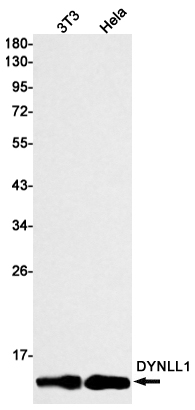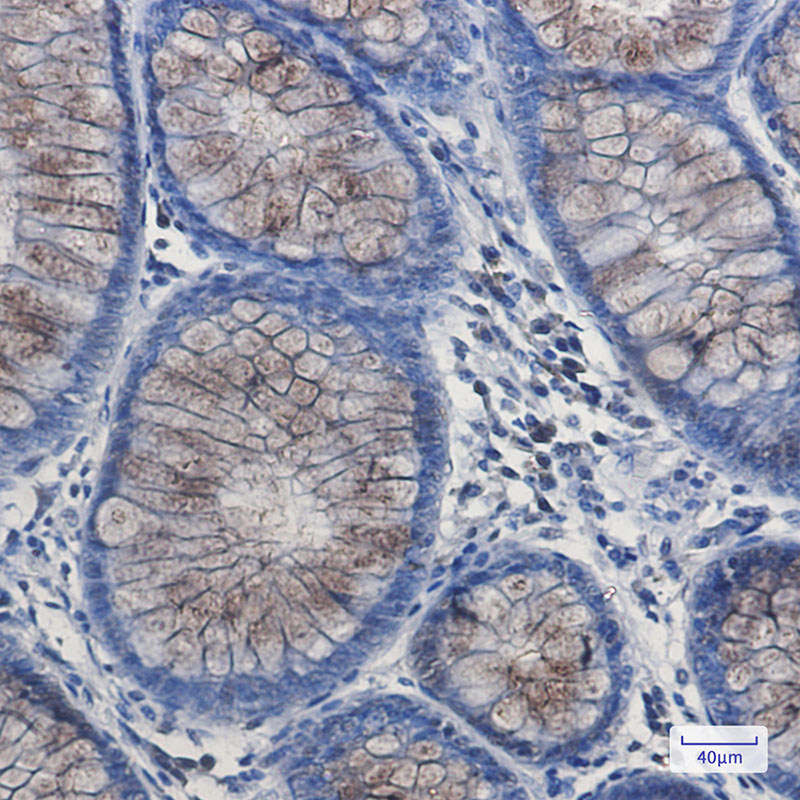

| WB | 咨询技术 | Human,Mouse,Rat |
| IF | 1/20 | Human,Mouse,Rat |
| IHC | 1/50-1/100 | Human,Mouse,Rat |
| ICC | 技术咨询 | Human,Mouse,Rat |
| FCM | 咨询技术 | Human,Mouse,Rat |
| Elisa | 咨询技术 | Human,Mouse,Rat |
| Aliases | LC8; PIN; DLC1; DLC8; LC8a; DNCL1; hdlc1; DNCLC1 |
| Entrez GeneID | 8655 |
| WB Predicted band size | Calculated MW: 10 kDa; Observed MW: 10 kDa |
| Host/Isotype | Rabbit IgG |
| Antibody Type | Primary antibody |
| Storage | Store at 4°C short term. Aliquot and store at -20°C long term. Avoid freeze/thaw cycles. |
| Species Reactivity | Human,Mouse |
| Immunogen | A synthetic peptide of human DYNLL1 |
| Formulation | Purified antibody in TBS with 0.05% sodium azide,0.05%BSA and 50% glycerol. |
+ +
以下是关于DYNLL1抗体的3篇参考文献及其摘要概括:
---
1. **文献名称**:*DYNLL1 binds to MRE11 to limit DNA end resection in BRCA1-deficient cells*
**作者**:Sartori AA 等
**摘要**:研究揭示DYNLL1通过与MRE11核酸酶结合,抑制DNA末端过度切割,维持基因组稳定性。实验中利用DYNLL1抗体进行免疫共沉淀,验证其在BRCA1缺失细胞中的修复调控作用。
---
2. **文献名称**:*The LC8 dynein light chain interacts with the E2F1 transcription factor to drive cell cycle progression*
**作者**:Hallberg B 等
**摘要**:该文献通过免疫印迹和染色质免疫沉淀(ChIP)实验,使用DYNLL1抗体证实其与转录因子E2F1的结合,调控细胞周期进程及肿瘤发生中的功能。
---
3. **文献名称**:*DYNLL1/LC8 promotes autophagy and inhibits apoptosis in hepatocellular carcinoma*
**作者**:Zhu H 等
**摘要**:研究发现DYNLL1在肝癌中高表达,通过Western blot和免疫组化(使用DYNLL1抗体)证明其通过激活自噬通路抑制细胞凋亡,提示其作为潜在治疗靶点。
---
这些文献均通过DYNLL1抗体开展实验,涉及DNA修复、细胞周期调控及癌症机制研究。
The DYNLL1 antibody is a tool used to detect and study the DYNLL1 protein, a member of the dynein light chain family. DYNLL1 (Dynein Light Chain 1), also known as LC8. is a highly conserved, ubiquitously expressed protein involved in diverse cellular processes, including intracellular transport, mitosis, apoptosis, and neuronal function. It acts as a dimerization hub, stabilizing interactions between components of the dynein motor complex and other binding partners, such as pro-apoptotic proteins (e.g., Bim, Bax) and transcriptional regulators. Dysregulation of DYNLL1 has been linked to cancer progression, neurodegeneration, and viral pathogenesis.
The DYNLL1 antibody is widely used in research to investigate protein expression, localization, and interactions via techniques like Western blotting, immunoprecipitation, and immunofluorescence. Polyclonal or monoclonal antibodies are generated using immunogenic peptides or recombinant DYNLL1 protein, with specificity validated through knockout controls or siRNA-mediated depletion. Commercial antibodies often target conserved regions, enabling cross-reactivity in multiple species (e.g., human, mouse, rat). Studies employing DYNLL1 antibodies have clarified its role in tumor suppression, neuronal transport defects, and cellular stress responses. Researchers also explore its potential as a therapeutic target, particularly in cancers where DYNLL1 modulates apoptotic signaling or metastasis. Reliable antibodies are critical for elucidating DYNLL1’s multifaceted functions in health and disease.
×